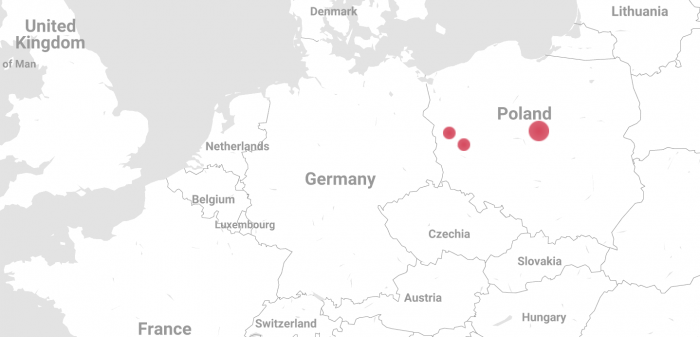African swine fever (ASF) has been discovered in wild boar just 40km from the German border, representing a worrying further westwards leap of the virus.
The Main Veterinary Inspectorate announced on Monday (December 2) that nine new cases had been discovered in wild boar, following the initial spate of around 20 cases in the Lubuskie province in November.
The situation is more serious than previously expected, according to Polish publication Farmer. The disease has also been found in the city and in the municipalities of Zielona Gora, Sulechow, Swidnica, and Nowogrod Bobrzanski, while two cases have been confirmed in the Nowa Sol commune in the Nowosolski poviat. This is just 40km from the German border.
The Polish and German pig industries were already on high alert after new outbreaks were found in wild boar in the Lubuskie province last month, about 75km from the German border, representing a big leap westwards by the virus of about 250km, suggesting spread by humans.
The first case was found on November 4 in a wild boar killed in a road accident. Poland formally notified the OIE on Nov 15. Foot patrols of the area by volunteers and the Polish army discovered a further 20 cases in wild boar in this part of the Lubuskie Province, plus one case in the Dolnośląskie Province, the Farmer reports.
A 5km fence was erected around the original site of infection, followed by a larger second fence to try and contain the virus.
The cases are a serious concern as the neighbouring Wielkopolskie province is home to 30% of Poland’s pig population. The disease has caused distress among local farmers, leading to protests demanding fair compensation and a reform of hunting law, to allow the reduction in wild boar numbers, the UK Animal and Plant Health Agency said in its latest ASF update.
Stanislaw Mysliwiec, president of the Lubuska Chamber of Agriculture, said he hoped the outbreak could be contained within the infected area and urged local pig holdings to comply with biosecurity rules to protect the domestic pig herd.
An outbreak in Germany, one of the EU’s biggest pig producers and a major exporter, would have even more serious implications. ISN, which represents German pig farmers, said the industry was ‘worried’.
Its message to producers, however, was ‘not to panic and to continue to implement biosecurity measures’. It called for the ‘utmost vigilance and caution’ from hunters, as well as ‘absolute compliance with the pig health regulation’.
Across Europe, there were 84 ASF cases in domestic pigs recorded in Europe in November, 78 of which were in Romania, compared with a recent peak, 643 in August, although the fall might be partly due to seasonal trends.
There were nearly 300 cases reported in European wild boar in November, compared with nearly 500 in August.
- The image is taken from the ProMed (International Society for Infectious Diseases) website: https://promedmail.org/




